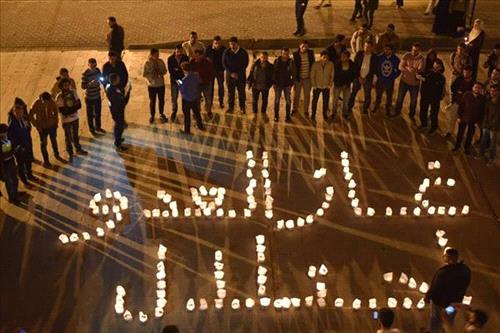Ammon News - AMMONNEWS - After almost 42 days of protests, university activists held a candle-lit demonstration on Sunday in front of the administration building at the University of Jordan to the “people’s persistence” in their rejection of the deal to import gas from Israel, activists said on Monday.
Shurouk Dawaghreh, a university student, said the protest, which took place during the “boycott hour”, was aimed at showing “the importance of the student body as a vital element of a developed country”.
For the past few weeks, activists have been calling for turning off the lights every Sunday at 9pm to protest the gas deal.
Students chanted folk songs during the protest to “emphasise their Arab identity”, an activist said.
“Students insist that they are against the gas deal. Even when almost a month-and-a-half have passed [since it was signed], we still agree that we do not want the enemy’s gas,” she told The Jordan Times.
In September, the National Electric Power Company (NEPCO) signed a gas deal with Noble Energy, a Houston-based company that holds the largest share in the Israeli Leviathan gas field, located in the Mediterranean Sea off the coast of Israel.
Even though it was organised at night, the activist said many female students showed up at the demonstration, which indicates that the gas deal with Israel “is an important issue” to Jordanians, the activist, who spoke on condition of anonymity, said.
“We expressed our views on this issue — it is also a way of pressuring the authorities to reverse the decision to sign the gas deal with an enemy… students will keep protesting until the deal is cancelled.”
Jordan signed a peace agreement with Israel in 1994 and is engaged in trade with it.
Government officials have said that the deal does not support the Israeli occupation of Palestinian territories, stressing the need to put matters in perspective since Jordan has signed a peace deal with Israel.
NEPCO says the gas deal with Noble Energy would “save Jordan up to $600 million each year”, with around 300 million cubic feet imported by the Kingdom daily.
With the inauguration of the 18th Parliament’s first ordinary session, students see a ray of hope to reverse the gas deal.
“We can make our voices heard and address people in charge. Although we are young citizens, but they have to take our rejection of the deal into consideration; we represent the whole country,” Dawaghreh added.
Activist Misbah Rimawi said students’ role is significant, since young people constitute the majority of Jordanians.
The fourth-year law student urged decision makers and MPs to “listen to the demands of the people — especially the younger generation, since they are the future”.
Earlier this week, the Boycott, Divestment and Sanctions movement issued a statement on Lower House deputies’ views on the gas deal.
The statement said around 31 MPs voiced their rejection of the deal, four MPs said they approve of it, 36 took a neutral stance, and 59 could not be reached by activists.
